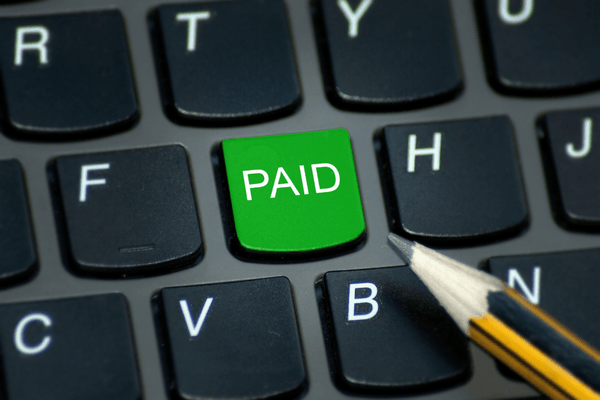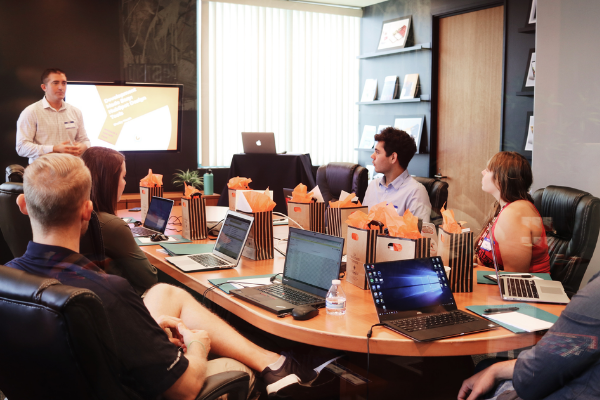Blog
Edit Widget Settings

By Andrew Stubbs
•
05 Jun, 2022
Here's some good news if your business sends invoices to business or government customers. Peppol* is on its way. (That's Peppol, not Peppa .) Ever had this conversation in your business? You or one of your team: "Hello, I'm calling to follow up the invoice we emailed to you last month. It hasn't been paid yet." Customer: "Really? We didn't receive that invoice?" In addition to the time and expense of following up, the cash flow delays create stress for you and they hurt your business. Thankfully, the adoption of Peppol will solve this problem. What is Peppol? Peppol is an obscure acronym for Pan-European Public Procurement On-Line. What's more important than what it stands for, is what it enables. Peppol is an international 'eProcurement' framework for the electronic exchange of information. It creates a standard approach for governments and businesses to structure and exchange information such as invoices and other documents. What Peppol means for you and your business Peppol makes electronic ordering, invoicing and shipping between governments and private companies faster, simpler and more secure. This means your business will get paid faster when dealing with government and larger businesses. In 2019, Australia and New Zealand adopted this platform for e-invoicing which, when implemented, will make 'we never received your invoice' issues virtually impossible. The new e-invoicing system is more secure than email and provides many other benefits. Which countries are adopting Peppol? There are currently 40 OpenPeppol member countries: 32 countries in Europe plus Australia, New Zealand, USA, Canada, China, Japan, Mexico and Singapore. Each country has a Peppol authority. For example, in Australia that's the Australian Tax Office (ATO). Is Peppol already in use? Yes it is. For example, the SuperStream system in Australia-which many businesses are currently using to automate the payment of employee superannuation contributions-is based on the Peppol protocol. How does e-invoicing work? The system connects the accounting systems of all businesses and government departments via the secure Peppol network. Suppliers generate sales invoices in their accounting systems which are sent to Peppol.

By Andrew Stubbs
•
04 May, 2022
If you're a director of an Australian company-or you plan to be-take 5 minutes now to read this article. All existing directors (and intending directors) of Australian companies need to be aware that the Australian Government has announced the introduction of a new mandatory Director Identification Number (DIN) system. (You'll notice the term director ID is also used for DIN.) This system is the initial step in the Modernising Business Registry (MBR) Program which has been established under the Treasury Laws Amendment Act which was legislated by the Australian Government in 2020. More information on the MBR program can be found here . What is the DIN system trying to achieve? The DIN aims to provide accountability and traceability of a director's relationships over time, across all companies and will provide information on a director's involvement in what may be repeated unlawful activity, including illegal phoenix activity. It should also solve the problem of false or fraudulent director identities. What are the key features? It is mandatory for all directors, foreign directors and alternate directors of Australian companies to hold a DIN. The DIN is a unique 15 digit number. The first 3 digits will be 036 which is the identifier for Australia. The last digit is a check digit to help with accuracy when quoting your DIN. Like your tax file number, you will only be issued with one DIN which you will hold for life - even if you cease acting as a director for any period. To obtain a DIN, you will need to prove your identity so you will not be able to hold multiple DINs. Other office holders (e.g. company secretaries) are not required to register. The director is responsible for updating the DIN records for any changes in personal information within 7 days of the change. The director must apply personally. The process cannot be completed by your accountant, lawyer, spouse or executive assistant. There are significant penalties for non-compliance. How do you apply for a DIN? Directors have 3 options for applying. You can apply online from 1 November 2021. To use this method, you must first establish your identity via myGovID (an app you download on your smart device which is different from myGov). Once set up, your myGovID will make accessing a wide range of government services easier. (It's not just for your DIN application). For information on how to set up a myGovID please go to https://www.mygovid.gov.au/set-up During the DIN application process, you will need additional information such as your tax file number (TFN) and your residential address as per ATO records. It would also be advisable to have other personal details such as bank account details, medicare card or a recent income tax assessment available in case these are required. You can also apply by phone ( 13 62 50 ). During the call, the operator will ask for the identity documents you would have used to obtain your myGovID (passport and driver licence) as well as the additional information listed above. These details will be confirmed with the records held on existing government databases and, assuming the details agree, your DIN will be issued. Or you can apply by mail, but this is not recommended because the process for doing this seems vague ("Write to us") which means you can probably expect a lengthy process of certifying documents and coping with the vagaries of the postal system. One of the other two methods would be a better choice. When will you need to apply for a DIN? Transitional arrangements will allow directors to become familiar with the new requirement. When you need to have a director ID will depend on when you were appointed as a director.

By Andrew Stubbs
•
07 Apr, 2022
If you're a small business owner, you're always on the lookout for better ways to go about routine tasks to boost growth and underpin reliability. So, yes, you have the will; now, what are the ways? What are those consistent routines you can instill that will have the most benefits? This article looks at the top 6 things you can do to help your business thrive. We're going to cover finances, goals, marketing, technology and you ! So, let's take a look… 1. Your finances are a scorecard … and a predictor Boil it all down and dollars in the bank are the report card on the health of your business operations. Surprising then that so many people don't really pay much attention to how much they've earned, nor how much they're likely to earn. As much as it might feel like a chore, reviewing your sales and financial projections and then using them to ascertain if you need business financing is a discipline worth cultivating . If you suspect that your cash flow is precarious, you should be checking out your options today. First metric to check: your credit score. If it is too low, you need to take steps to shore it up. Next, check in with your bank or finance broker about what loans are available. 2. Goal setting, goal achieving, goal celebrating So, if you're using current and future dollars in the bank to keep score, the next thing is to do something about it. This is where goal setting comes in. If thoughtfully set and persistently pursued, goals help you orientate your willpower and your energy at each moment of the business day. This is the hidden power of goals: giving you a good sense of direction and a way to channel your instincts towards wise objectives. Constantly checking in with your goals makes them a benchmarking tool to keep your business pointed in the right direction. Yes, just having goals helps. Actually achieving a goal helps too, of course! 3. Increasing the impact of your marketing Marketing is not magic. It is not a mystery. It is not an art. However, many less-than-reputable marketers will try to claim that it is. They do so to gain wiggle room to pad their invoices and cover up their lack of skill. What this means is that it is easy to waste money on ineffective marketing. The good news is that there are many low-budget marketing strategies that actually work to help grow your brand and reputation. Scout around on the internet and choose one or two new tactics. Deploy them and test them. If they work, double down. If they don't, try something else. If you can't tell if they're working, also try something else. Social media is the obvious starting place for these low-stakes experiments and the old classics of LinkedIn, Facebook and Twitter are where to trial them. 4. Bringing your business up to date technologically The ability of modern productivity and project-management tools to give small players the same capabilities as the big boys simply cannot be ignored. Harness them properly and they'll let your small businesses operate with the same productivity as the titans of your sector. And, if your business is in the services sector, the increased controls that business technologies can yield also lets you be highly agile - that's something the big boys can't do. So, ask yourself: are you taking full advantage of what's out there? Don't worry, the answer to this question is always 'no' - the field is simply moving too fast for anyone to be able to take full advantage. However, if you have a realistic view of your needs, then you have a yardstick to help assess all the solutions out there. When you know what you need the technology to do, then you can wisely choose what hardware, software, platforms and techniques to introduce. 5. SEO has changed and it is going to change again Google - indeed all platforms offering broad search functions, from Youtube to Facebook - are constantly altering and optimising their algorithms. This, in turn, means SEO practice must constantly evolve to keep pace. So, if your SEO approach hasn't been overhauled in a few years, the time has come to give it some attention. Do a review of best practice and score how you cater to SEO in your online presences. Yet, because the underlying concept of SEO has not changed, the corrective actions you need to take may not be major. Then again, they might be! It is better to know unpleasant news sooner than outright bad news later. 6. Download the right new apps The remote work trend has gone mega and this means mobile productivity apps are very much of-the-moment. See, you can get a surprising amount done with just your phone and tablet. And apps are how it all happens … plus connectivity and a full battery, of course! Usually, apps are best for keeping an eye on things, boosting effectiveness on the "busy" tasks and enabling you to give your stamp of approval to work that needs your say-so to progress. In general, these are not value-adding tasks, just the value-neutral tasks that get in the way of the value-adding tasks. Now, there is no end of apps out there. So, as always, don't bother looking until you have some idea of what you need. 7. You are the ultimate business tool Health is the single most important aspect to consider for anyone running a business. It's the non-negotiable factor that governs everything else you are capable of. To adapt a quote from Arnold Schwarzenegger, being fit and healthy is "a status symbol. It reflects you worked hard for it; no money can buy it. You cannot borrow it, you cannot inherit it, you cannot steal it". This means that you must get enough sleep every night (most people need 7 hours or more). This means a healthy diet must become your preferred way of eating. This means that you should exercise every single day (except when sick). This means you must give your mind a rest too . Meditation isn't some mystic monkish thing, it's simply the practice of letting your thoughts come and go while you - the observer - stay peaceful and undisturbed by them. Think of it like this, meditating is mediating your mind. Take stock, choose wisely, make small steps in the right direction In this article, we've talked about some improvements you can make to what you're already doing. You don't have to do all of these at once. Start with the one that seems easiest and then stick with it to see if it works. Remember, it's not always about big changes. Often, you can make major improvements in outcome by making small changes to input. Doing the little things better. So take stock, choose wisely and be sure to make those small steps in the right direction for success today, tomorrow and the next day.

By Andrew Stubbs
•
28 Feb, 2022
Of course you want your company's online presence to be the best it can be , but the path to reaching that goal is a labyrinth of different approaches, tactics and strategies. Where do you even begin? Well, if you are asking yourself that question, this is the article for you. Over the next several hundred words, we're going to review the central aspects of establishing a well-rounded online presence for your business. Now, for many small business owners, this challenge is often left in the "too-hard basket" as they focus on the aspects of their businesses they're more comfortable with. They do this even though there is often very ripe and very low-hanging fruit there if they were to engage online in the right ways. However, before we go too far here, let's define what online presence is in functional terms. Simply: your " online presence " is how easy it is to find you in the digital realm , either on the web, social platforms or some other cyber field (such as app marketplaces, for example). This ease-of-finding is crucial for establishing, building and defending your brand . A good presence means your brand reputation is clear, brand awareness is strong and that your products, services or solutions are ideally placed among the results when users search the related keywords. In the early days of the web, a website whose design or functionality had something new to offer - great design, a flashy gimmick or free downloadables - was enough for a brand to stake its claim. Those days are gone. We're now in a more sophisticated era where the right fundamentals, careful planning and sharp targeting makes more headway in the labyrinth. Make no mistake, having a well-rounded online presence still "works". It will still help you reach the right customers and build your bottom line . So, let's get you started… Online presence boosters - 4 of the best 1. A good-looking website If you want to be a leader in your field, you must look the part. This means your website must measure up in the aesthetic stakes. Often, you'll find there's a trade-off between looks and usability. A good rule of thumb is to push your designs until it starts impinging on good user experience, then step it back. Once you have the website's appearance and "handling" dialled in, you then have to add content that's just as focused. Your site info must be brief, targeted, compelling, accurate, well-written and easy to read. 2. SEO makes your site grow Aesthetic appeal matters, but among the billions of sites on the internet you first need to be found. This is where good SEO comes in. A capable web designer will instill the right SEO approach to help people find your business through Google and other online tools. Websites with appropriate SEO will have less competition when it comes to ranking well within various searches. The more prominently your business is displayed in the right search results, the more leads you'll receive. 3. Social media: making friends influences people Social media is not going away and it deserves pride of place in marketing efforts to boost an online presence. More than just making friends, social media has several other positive effects. First, it raises awareness because your messages will propagate through the social media platform to reach all-new audiences. Second, when you have a solid set of followers, they will tend to clump together into a community of interest that, when stimulated by your videos, photos, updates and such, will speak to each other. Their favourite topic? You! They may soon start reposting your material, thus causing your social media marketing efforts to grow by themselves. Third, if people believe in what you're doing and trust your integrity, don't be surprised if they start feeling like "part of your company" - promoting and defending you online, all without your encouragement. 4. Do not 'set and forget' One of the most important signals used by the owners of online ranking platforms - whether those are social or search - is how frequently you post, engage, comment or, simply, interact on their platform. This is a case where more is definitely more - the quality and quantity of your use behaviour is a reliable way to tip just about any algorithm in your favour. So, become a power user of all your channels. Post regularly. Post good stuff. Reply to comments. Make connections. As this approach can be a major time suck, it might make sense to hire a content manager/social media manager to keep on top of it all. Get started on rounding out your online presence So there you have it: the fundamental points to cover in getting the most out of your online presence. As with many of the digital aspects to business management, the first challenge is getting your bearings. Knowing where to start and in what general direction to head makes it all the easier to take the next step. And the next. If you still need a nudge to get going, it always pays to reach out to experts you can trust.

By Andrew Stubbs
•
02 Feb, 2022
As an entrepreneur, you must have functional leadership skills. It goes with the territory. These skills are key to managing and motivating employees, communicating with customers and inspiring people through your clear company vision. No, leadership is not one-dimensional: there are plenty of different approaches to the practice of good leadership. In this blog post, we'll discuss how entrepreneurs like you can become better leaders in their small businesses. There's no denying that running a small business is both demanding and rewarding. No denying either that people management has a major role in both. Whether you're just starting out in business or have been in the game for some time, this article counts down the eight most useful tips for meeting - and exceeding - the difficulties of small business leadership. 8. Inspiring Others With Your Small Business Vision The initial step in creating a business vision is working out what it will encompass. That is, what are the parts of your operation where the special "way we do things" is pivotal? In what parts is it merely optional? For example, for a product-led business, your vision might pertain to design and quality, whereas for a service-based business the vision might speak more to customer service. A brand-first business might emphasise packaging and positioning. Make your vision as specific and detailed as possible. What does success look like? Describe what it feels, sounds, tastes or smells like. Convey this in a compelling way and you'll get your whole team aligned. 7. Get Buy-in For Your Vision Visions take a little while to crystallise; by the time yours does, you will know it inside-out and back-to-front. This is good, because now you must get your staff and stakeholders up to speed on it too. Creating "official" printed vision statements is useful and often necessary, but vision implies visual . Provide some kind of imagery that shows your business vision at work in the real world. Sketch out how your products will be used, how your premises will operate, how your people will deliver your services - all can illustrate the essence of your business that makes its value prop compelling. Of course, that vision statement you worked on so hard should also be highlighted for how it is expressed in your concept images. 6. Take the Initiative to Ensure Open Communications Solid communication with other coworkers is essential if the business wants to be successful. After all, if your team doesn't communicate, how can they know what is expected of them? Many of the ills in many companies lie in their inability to communicate effectively. If you can't get on the same wavelength as your staff, they will only be able to understand your communications "to the letter" rather than being able to get the spirit of what you intend. And, the onus is always on you to speak to your team at their level and in ways that are relevant to them. If you are not so good at verbal communication, try using email backed with conventions and policies that keep the comms clear (one good rule is to have only one topic per email). A team chat is often also handy. Implement one of these and it means everyone has a voice and everyone's input can be seen and addressed methodically. 5. Break Down Your Own Barriers As an entrepreneur, you're always pushing yourself. Your ambitions and goals are what sparked your entrepreneurial ways in the first place. However, if you're not careful, this self-directed drive can lead to a lack of self-awareness. What you don't know can hurt you. A thoughtful leader will take time out from all their hard work for some introspection so that they have a clear understanding of the gaps in their own skillset and how to fix them or work around them. It often comes down to setting up procedures with more care or altering your expectations of others. Without an honest sense of which aspects of your character, skills and intellect are mediocre, you will subconsciously program corresponding inefficiencies into how your organisation functions. Confronting the inevitable fact that you have shortcomings might hurt your ego temporarily, but not doing it will cripple your success permanently. 4. Be More Effective at Giving and Receiving Feedback When running a business, you must create space for feedback and discussion. There are two main channels you must set up: one to receive input from customers and the second to encourage dialogue between yourself and your employees and/or partners. Providing these outlets will help you more effectively give or receive feedback in the future. Further, when people give feedback you must use active listening and interpretive skills to understand not just what they are saying, but why they're saying it . If, for example, a product malfunctions, is the customer really complaining because the product didn't work or, rather, because the malfunction feels like you've broken a promise to them? 3. What is Your Business Good At … And Bad At? An extension of the practice of looking at your personal strengths and weaknesses is looking at those of your business itself. The classic business analysis tool of the SWOT comes into play here. As the acronym goes, it helps you identify and categorise: Strengths, Weaknesses, Opportunities, Threats. It can be applied at every scale , from the micro - say, a single product line - and right on up to encompass the whole of the business. Further, because it seeks to account for every contingent factor, it also looks at what external forces and developments are in play. 2. Giving Your Team True Motivation The secret of great leaders is that their people believe in them. That is, they are backed by a team that cares. This care - not money, not prestige - is what makes for true team motivation. This means that team engagement is a fundamental task. To gain this kind of engagement, you must provide your team with a stimulating environment, sense of purpose and meaningful work. Get it right, and your team will always go the extra mile for your business because what lies on that mile accords with their personal values. 1. Approachability, Commitment, Honesty - The Big Three You can't be a great leader if people think you are unwelcoming, are flaky or are evasive with the truth. However, as "the boss", there will always be a perceived status barrier for staff wanting to engage with you. It is upon you alone to bring that barrier down. Try keeping your office door open and make a point of welcoming people in for a catch-up. Demonstrate that you are committed through modelling ideal company behaviours, such as regarding your presence during business hours. And, last, the most effective way to prove that you are honest is to back up verbal promises by following through in action . Leadership Is Initiative Made Social Leadership is something many entrepreneurs don't engage with consciously. In running their teams, they just do what feels right and what seems to work . There's no one around to tell them any different. However, you cannot put off developing your leadership skills if you want your team to do its best work and for your business to achieve its vision. Think of leadership like an iceberg; there's much more going on below the surface than what most new entrepreneurs expect.

By Andrew Stubbs
•
09 Jan, 2022
Think of all the information you use in your business. Chances are nearly all of it is electronic – your website, emails, accounts, CRM and payroll information are probably all stored electronically, either in your office or somewhere in the cloud. Now, what would happen if you suddenly lost it all? What if you found someone had deleted it all, or encrypted it so they can charge you a fortune for the decryption key? What would you do? Could you get it all back? How long would it take? And could your business survive the disruption? The reality of cyber attacks While this may sound like a nightmare, cyber attacks like these are becoming more and more common. They're now the fifth largest global threat (just behind data fraud), and no business can afford to just sit and hope it doesn't happen to them. "But mine is just a small business?" I hear you say. "Why would they attack me? Quite simply, because they can. Most cyber attackers aren't doing it to make a profit. They simply want to cause as much disruption as they can, knowing the business they attack will suffer significant downtime, financial losses, and damage to its reputation. Unfortunately, even the best defences from your IT department or service provider can't keep them at bay if your employees are letting them in the front door. It could be opening that 'phishing' email and unknowingly installing a virus, giving their ID and password to the 'person from IT' on the phone, or even accessing the office network from a laptop over an unsecured wi-fi connection. Which is why you need to teach all your employees about cyber security and how to avoid falling for these traps. And you need to have regular training sessions to keep them up to date on how to defend themselves from the latest methods of attack. What your employees need to know Your employees should know how cyber attacks happen, particular in light of "social engineering" attacks – phishing emails, phone calls asking for login information, etc. This teaches them what to look out for, and how they can stop the attackers in their tracks. They should also know what to do in these situations (especially if they accidentally do something wrong), and how to report them. You may want to arrange random 'tests' to see if your employees know what to do. For example, have someone pretending to be from the IT department ask for personal information. Do they report it, or do they give up the information? Educate your employees about scanning USB devices (ideally on a standalone computer) for malware and viruses before opening any files on them. What you can do You can also help your employees follow safe IT practices to minimise the chances of an attack. Give all employees with laptops access to a Virtual Private Network (VPN) service and show them how to use it. This will stop attackers 'eavesdropping' on their information if they're using an unsecured wi-fi connection. Encrypt the hard drives of all laptops. This will prevent the information on them being accessed if the laptop is lost or stolen. Have your IT team set up a policy that forces all users to choose strong passwords (i.e. using upper- and lower-case letters, numbers and symbols), and change them every month. Make sure all computers are running anti-virus and anti-malware software, and that they are kept up to date. Stay vigilant, stay safe The reality is that your business will never be safe from cyber attacks. But educating your staff, and giving them the tools to defend themselves, will greatly reduce the chances of your business becoming the attackers' next victim.

By Andrew Stubbs
•
02 Dec, 2021
Hybrid teams are a new and still-evolving form of work culture. Increasingly common in modern organisations, a hybrid team is one made up of staff who have differing "work modes". These are teams with some mix of employees who telecommute from home, freelance workers hired locally, subcontractors working remotely, staff members who attend the office at their discretion and full-time staff who work the traditional Monday-Friday office hours. There can even be people who shift between all those modes as their tasks evolve. The hybrid team trend has been gathering momentum for a long time, and, as it comes to full flower, it presents management with new challenges around keeping their crew cohesive, coordinated and effective. Meeting these challenges with new skills and tools is the topic of this post. Read on for some pointers that will help you get to grips with hybrid teams, how to overcome their unique obstacles and, ultimately, lead one of these teams effectively. How To Successfully Manage A Hybrid Model Team 1. Social Technology For The Win. If anything has enabled a remote or hybrid team to work well, it's high-bandwidth internet connections that underpin social technology tools such as Slack and Zoom. These technologies enable new forms of remote yet real-time collaboration . When coupled with solutions that make team collaboration easier, such as Google Workspace (recently renamed from G Suite), the ability of your people to quickly and seamlessly have planned or impromptu videoconferencing calls via your preferred service is greatly magnified. So long as the time zones and availabilities work out, it doesn't matter where your team members are physically. 2. Fostering a Remote-First Culture What does it mean to be remote-first? It's not just a buzzword. To put it simply, this approach makes remote work the default for your team. People are enabled and empowered to successfully do their jobs from anywhere. Even if you have employees who are working on-site, you, as manager, are still focused on leading a remote work team. When you make this shift in approach, it helps you get the right systems and processes in place to enable your entire team to do great work. Those working at the desk next to you enjoy the same quality of engagement and support to be effective as those who are on the other side of the world. Indeed, nothing really changes for any of the team members when you, the team leader, are the person whose work location changes from one day to the next. To achieve this, your employees should have access to the same files, the same information and the same resources regardless of where they're working. They might not get the free break room coffee when they're working from home, but everything else they need should be easily and equally available to them - including access to your advice, expertise and support. 3. Set Expectations and Accountabilities Early There are generally two ways an existing team becomes "hybrid": a top-down corporate policy change or by evolution as more hybrid options are gradually introduced. Either way, when it is clear that your team is now hybrid, you must set expectations and make accountability clear to all staff. Both your home and office-based employees must understand how they can work together productively and have an unequivocal view of who is doing what . As part of this, you might run regular meetings with your entire team to start each day or week on the right foot. From this common touchpoint you can then share progress regularly on key projects with the entire team to maintain momentum. 4. Define Clear Working Hours When everyone knows when everyone else is available - and not available - it helps you and your team know what to expect from their co-workers. Sharing work calendars will help to further boost the visibility of this crucial information . It will enable your team members to keep abreast of whether someone is "on the clock" and what they are doing at any one time, including colleagues who they do not physically sit near or may never have met. 5. Understand the Benefits of Each Working Situation to Ensure Fairness Knowing how all the different working modes play out in real life is important because, for example, your employees working from home may find it easier to maintain a healthy work-life balance than those who are in the office most of the time. You might therefore try to encourage or facilitate the same level of balance for your office-based team members. Perhaps give them the flexibility to pick their kids up from school or go for a run during working hours. It's also important to role-model healthy working behaviour yourself , regardless of where you are based. 6. Commit Equal Time and Focus to Each Member of Your Team. The amount of attention and help that you give to each employee shouldn't depend on where they're working or what their role is. Just because some members of your team work remotely, they should not receive less of your time and support. Likewise, just because someone is nearby, that doesn't mean they can waltz to the head of the queue when they want access to your time or guidance. The convenience of proximity should not be a reason to skip the proper protocols. 7. Be Mindful of Communication. It's unavoidable that your remote workers will miss out on face-to-face interactions - both with you and with their teammates. Because of this, you'll need to think carefully about how you can make them feel equally included via virtual remote meetings. This goes double in those instances when your end of the virtual meeting has more than one person sharing the same camera. It can very quickly make the remote worker feel like the outsider in an us-and-them workplace dynamic. Managing a Hybrid Team: Maintaining Awareness is the Key At the end of the day, managing a hybrid team means maintaining awareness. Remote staff and on-site staff have different experiences. Acknowledge, understand and anticipate them and then be proactive to level the playing field. Maintaining strong team dynamics is the goal. Choosing the right technology plays a pivotal role; so too does maintaining strong communication and information-sharing practices. Next, ensure your assignments and responsibilities are clearly set. Finally, give everyone some travel flexibility. Find the right balance between these key points and you will set your people free to do their best work: your hybrid team can then really perform!

By Andrew Stubbs
•
04 Nov, 2021
Productivity and mental health may not seem like obvious partners, but the truth is they work hand-in-hand. For many of us at work, as business owners or employees, there is pressure to not only stay productive but to accomplish more and more. And, while many of us are working from home, maintaining productivity can be difficult due to the state of our mental health. Stress can easily cause anyone's mental health to deteriorate without adequate self-care. Let's face it. There will always be days when you just can't be as productive as you might have to be. There will be days when you don't know how to stay focused on accomplishing tasks. So it's good to check in with yourself every now and again about whether you're doing everything you can to minimise stress and increase productivity . These higher levels of stress and lower productivity can occur for you personally as a sole trader or small business owner, or for the staff or contractors that you rely on. Work-related stress is a major cause of occupational ill health, poor productivity and human error. Why is mental health in the workplace so important Many business owners know that mental health in the workplace is important, but don't necessarily know what to do about it or where to start to find out more. Even so, workplaces play an important and active role in maintaining people's mental health and wellbeing. Further, every business has a legal and moral responsibility to provide a safe and fair workplace for its people. It even makes good business sense. Creating a mentally healthy workplace has many benefits for both employers and employees. A well-designed workplace should support individual mental health and happiness. The flow-on effects - reduced absenteeism, increased employee engagement and group productivity - are certainly all things any employer would want to promote. It's simple: healthy people are more productive - not only because they, and you, can produce more, but that production occurs more successfully. What is mental health, exactly? The term 'mental health' is often used as a shorthand substitute for adverse mental health conditions, such as depression and anxiety. But the World Health Organisation actually defines mental health as a state of wellbeing in which every individual: realises his or her own potential can cope with the normal stresses of life can work productively and fruitfully is able to make a contribution to his or her community. One way to explain the distinction is to imagine mental health as a spectrum, with everyone varying over their lifetime - for some, on a daily basis. The mental health spectrum runs from positive, healthy functioning at one end, through to severe symptoms or conditions that can be disabling on the other. Essentially, good mental health is about being cognitively, emotionally, and socially healthy in the way you think, feel and develop relationships. It is not merely the absence of a defined condition. What this means is that even if someone, or you, is not experiencing a defined mental health condition, it doesn't necessarily mean that your mental health is optimal. Likewise, it's possible to be diagnosed with a mental health condition while feeling well and productive at work. This complexity is why many people initially misunderstand what is meant by 'mental health' and why regular check-ins to consider your mental health are valuable even if you feel like things are going well enough. Tips to improve mental health So, how do you go about improving your own mental health and supporting your staff in managing their own? Here are six steps to personally consider: 1. Start your day with exercise More than an espresso double shot, the best way to clear a sleepy head and get your blood flowing is exercise. You don't have to visit the gym, go boxing or lift weights - any physical activity that will get your heart rate up can help. You can walk around at home, run up and down the stairs three times, do a 20-minute aerobics session (lots of aerobic videos available online) or just walk your pet to the park. Physical activity at the start of the day really can do wonders in helping improve your concentration and attention over the hours to come. 2. Get back to nature You might be surprised to find out how much of a positive effect there is in being around plant life , both mentally and physically. Many studies point to the ability of plants to boost our mood and productivity, lessen stress and fatigue, clean our air and generate a feeling of overall well being. So, consider adding plants to your immediate working environment and aim to take your breaks with some nature around you. 3. Stop sitting Turns out that generally speaking, sitting is bad for us. The Yale School of Medicine has found that sitting is linked to numerous medical conditions , such as lower back pain, heart disease, obesity and more. Poor physical health in no way improves our ability to be productive or manage self-care to improve mental health. Therefore, to combat the habit of incessantly sitting, consider investing in a standing desk or, better yet, make your own. If you're still at a loss, practice setting timers to remind yourself to regularly stand up, move and take a walk. 4. Drink water Always drink water. Simple, right? Perhaps not. It's easy to forget to drink water when you're working non-stop or throwing back espresso shots. Dehydration can be incredibly debilitating physically as well as cognitively. As reported by the British Nutrition Foundation, even mild dehydration can seriously hinder your mental performance in memory, attention, concentration and reaction time. 5. Know when to ignore your inbox You've heard the rumour and it's true: checking your email less often leads to more productivity. According to the Harvard Business Review, over-checking email wastes 21 minutes per day (at a minimum). Although this clearly slows down your productivity, over-checking your inbox can do other kinds of harm. Excessive use of email can create a culture and feeling of being 'on' non-stop. Furthermore, the constant ding of notifications and the replacement of face-to-face time can cause feelings of being isolated and drowning in work. Anyone who has suffered those already knows how much they can contribute to stress levels. 6. Maintain a healthy lifestyle Simply put, the way you treat your body has a direct effect on the quality of your mental process and your overall productivity. With a healthier lifestyle, your ability to focus and create will improve and you'll be more efficient in accomplishing tasks. By getting enough sleep, eating healthy food and avoiding vices such as drinking alcohol, smoking and doing drugs, you can keep your mind and body healthy and in good condition for both work and home life. Mental health for the win Following and promoting this list of actions to undertake to improve mental health can be a game-changer . In the workplace, you can be a role model for your staff and colleagues. By talking about mental health and making positive steps to stay on top of any issues, you instill a culture where these topics are safe to explore, engage with and address. It is high time mental health stopped being considered a taboo subject for discussion in the workplace. Bringing it into the light takes leadership - and you're your business's leader. It's up to you. So be open, be honest and take action. You may be surprised at the impact you can have on those around you.

By Andrew Stubbs
•
06 Oct, 2021
Whether your business sells to people or to other businesses, whether you sell a product or a service, finding new leads is always vital. More leads - the people or businesses interested in you - means a bigger market to sell to. Because of this, many successful small business owners continuously look to expand their customer base and grow their businesses by lead generation. Lead generation is a term you hear a lot. Simply, it is the process of attracting and converting strangers to your business into people who indicate interest in the product and/or service you offer. With business growth usually being a difficult and long-term process, the role of lead generation in feeding into a steady stream of sales is one of the true fundamentals to get right. Lead generation is important for: engaging with potential customers in a personal way increasing your client base building revenue. But what exactly is a 'lead'? Basically, a lead is any person or business that has an interest in the products or services you are selling. You may find these leads by collecting names at a trade fair, via an online survey or calls from an ad. In the B2C world, the lead is often the user or consumer. In the B2B world, the lead is often a representative of a group of users or consumers. Naturally, you need leads to generate sales, and, just as naturally, not all leads convert into customers. Some leads have a better prospect of becoming paying customers than others. These are the quality leads you want. Because generating each lead costs your business money, an effective lead-gen strategy should focus on maximising the number of high-quality leads, while filtering out those that are less relevant. How do I find more leads? What you want to do is create a system that will help you identify sales leads for your small business, and then - with the appropriate level of marketing, focus and effort - turn them into customers . The method that works for your business may be quite specific and you may need to use some trial and error to find out what works best for you. Further, as markets are always fluid, what worked well yesterday might not work so well tomorrow. It, therefore, makes sense to consistently return to your lead-gen strategies and look for ways to make 'good enough' a little better. So, here are 6 tips for getting your small business's lead generation on the right track: 1. Identify your target audience The first step of lead generation is simply knowing who you are pursuing - your target audience. You can't successfully reach and sell to your ideal customer if you don't know exactly who they are. Research your audience and come up with a clear picture of the relevant aspects of their identities , where they live, what they like to do, how much money they make, what their lifestyle and personality are like, etc. 2. Create a LOT of opt-in opportunities Webinars, free reports, live demos … don't stop at just one or two opt-ins. Turn every blog post into an opt-in page. You can give away recipes, PDFs of your blog posts, worksheets, resource guides and more. The trick is to make those opt-in opportunities irresistible . 3. Always be testing Getting great advice is a good thing, but it's dangerous to think that because it worked for someone else, it'll work equally well for you. That doesn't mean you should ignore great advice, but that you need to test, test, test - and do the testing right. Research different testing methods and adjust to suit your business. One method is to test using different terms online to improve your data collection. For example, do you collect more leads by a button that says "start your trial here" OR "start my trial here"? Simple changes can reap great rewards. 4. Use an email newsletter Now that your opt-ins are dialled in, it's time to cultivate the relationships you're forming. Grow the connection to develop prospects from the lead stage through to a sale (and eventually a repeat sale!). One of the best ways to create consistent communication with your prospects is through an email newsletter. This helps you develop an ongoing relationship that also has benefits for word-of-mouth referrals. 5. Leverage social media Social media provides many opportunities for small businesses to create conversations with prospective customers and generate new leads. It is an important way to connect and engage. You can create a Facebook page, Twitter profile, LinkedIn company page, Pinterest account or a YouTube channel to attract and engage your audience, then funnel them through your process to become leads. The platforms you choose to use will be largely determined by your target audience and what they use themselves. Best of all, once you know which platforms to pursue, setting up a profile there will be free. 6. Use Gmail ads to target competitors' customers Here's another tip for generating tons of leads , at the expense of your competitors: Gmail Ads. This is a powerful tool for getting right in front of your target audience right in the place online that they visit most - their inbox. Visit the link to find out more. Become a lead-generation leader Lead generation should be thought of as a long-term and continuous process. If you get an efficient system in place using the sales lead tips above, you can then streamline the process and increase your opportunities for business growth. Constant lead generation gives your business not only a chance to increase sales but constantly finding new sources is a chance for renewal. New clients and customers provide a different perspective and can lead to even more opportunities. Because where you lead-gen leads, your fortunes tend to follow.

By Andrew Stubbs
•
08 Sep, 2021
Business is ticking along nicely for you. Key performance indicators have been decided. Your markers are being met. Growth is steady. Employees are content. But did you know you could be doing even better? How? Benchmarking. Benchmarking is the process of measuring the performance of your products, your services or your processes against those of other businesses . The concept reflects the idea that performance measurements (including those useful KPIs) mean very little in and of themselves. To become meaningful, they need a basis of comparison. You can't just look at numbers in isolation; rather, they need to be compared to - that is, benchmarked against - an objective standard or reference point. What is benchmarking? Benchmarking has a long history of use in the manufacturing industry, where measurements are easily generated from physical products. These days, it is being used by businesses in practically all sectors. Across the economy, enterprises are comparing KPIs and performance measurements to industry standards. The comparisons can be made in a variety of areas: financials productivity costs overheads turnaround time customer satisfaction customer retention safety employee retention. As the practice developed quite a bit from its earlier manufacturing days, you now have quite a lot of latitude in choosing what your business wants, and maybe needs , to benchmark to make your business better. The top 6 reasons why you should benchmark Some businesses choose not to benchmark, believing that they should not be copying any other business. In answer to that, we say that they should be aware that benchmarking does not mean blindly 'copying' what competitors do. It means understanding what is the acceptable standard in the industry, and where you stand in relation to it. Simply put, benchmarking provides insight, leading to discovery and onwards to improvement. Through it, you can: identify opportunities, strengths and weaknesses understand customers' needs monitor performance and manage change. With all this in mind, the top 6 specific areas of your business that benchmarking will help you improve are: Staff effectiveness: Improve understanding of your cost structures and internal processes; encourage team-building and cooperation; and enhance familiarity with key performance metrics and opportunities. Improved quality: Benchmarking helps you continually improve the quality of products and services. You can discover the current standard, and then try to surpass it. Better performance: Overcome complacency. Always striving to improve performance standards will help you stay relevant in the market. Cost efficiency: Gain valuable data on the latest technologies and processes in your industry, which can increase productivity while reducing cost. Prioritising areas of improvement: If you're unsure about where to start raising the game, then benchmarking will help you identify the largest gaps between your standard and the best in the industry. Leveraging strengths: Throw light on - and get validation through - the areas where you're clearly doing better than 'the rest'. This is useful in planning your marketing. Examples of the questions you can ask in a benchmarking exercise include: How does your gross profit margin compare with industry leaders? Are your productivity levels and overheads higher or lower than your main competitors? Is your turnaround time slower or faster than the industry average, and by how much? Is your employee staffing level optimum and how does it compare with other businesses in your industry? How does your quality compare to your competitors in terms of number of rejected/defective items, or on return clients? How do you find the data you need? It sounds easy: find the data and compare. But how do you go about collecting that data? There are several ways. These are the best: Ask your business or industry association: Many associations collect this detailed information and members can use it for measuring their performance. The Australian Tax Office: The body's small business benchmarks are a useful guide for comparing your business's performance against similar businesses in the same industry. Use a commercial benchmarking business: This will cost you, so make sure you do your research and find a company that provides what you need. Your accountant, business networks or industry association may have recommendations for a suitable firm. Also ensure that: Do your own benchmarking: If you have the expertise, you could do your own benchmarking. You will also need to set aside quite a bit of time: first to find and access the data you need, and then to research and record your results. To make this process easier, you could also use a combination of data from a commercial benchmarking company and your own research. 6 steps to successful benchmarking So let's say you've decided to tackle benchmarking in your business, and are now ready to take the plunge. Use these steps to work your way through the benchmarking process: Identify what you're going to benchmark: Choose a product, service or department to benchmark and start with targeted and specific questions. These questions should be able to be explored using qualitative or quantitative research, and be in line with your business strategy. Identify your competitors: Write down a list of who your competitors are. Most businesses benchmark within the same industry. Identify effective tactics used by your competitors and the areas in which their business is performing better than yours. Look at trends and collect data: Look at recent statistics to analyse any current trends for insights into how fast your industry is moving and how you can plan ahead to keep your business in tune with customers' needs. Collate the data you need. Outline your objectives: After the results of the analysis have been interpreted and communicated to the right people, goals should be established - these should be concrete, attainable and in line with your business strategy. Make sure you list all your goals in your marketing plan. Develop an action plan for your objectives: Define specific, concrete actions to be taken. Your actions should detail the tasks involved and include specific names and dates associated with each task. Monitor your results and implement the action plan: Continually monitor the results of the actions you undertook following the benchmarking, and ensure the plans are applied consistently. Setting a new standard Comparing your business with others can be daunting, but it's worth it to take your business to a new level - to set that new standard. While measuring performance by monitoring KPIs has become regular practice for many businesses, taking the next step of benchmarking can really elevate your performance. Without benchmarking, those KPIs can simply be numbers in isolation. Without context or reference point they have little meaning. If you're convinced that benchmarking is worth a look but feel these action steps are overwhelming or that the idea of benchmarking too complicated, please talk to us. Remember, insight leads to discovery and business improvement. Contact us to find out more .
Contact Us
Physical Address
Level 26, 44 Market Street
Sydney, NSW 2000
Australia
Find us on the map
Postal Address
Po Box Q284, Queen Victoria Building
NSW 1230, Australia
Ph.
02 9299 1555
Fax. 02 9299 1055
Email. mail@stubbsco.com.au
Copyright Stubbs & Co ©
| Disclaimer
| Site Map
| Websites for accountants by Wolters Kluwer
Liability limited by a scheme approved under Professional Standards Legislation.





